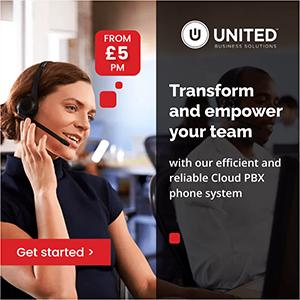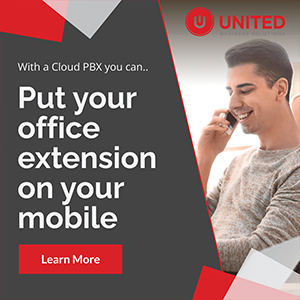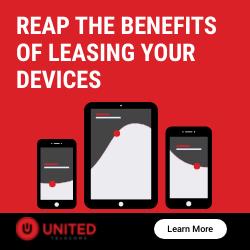Blog
Why Should you Move your PBX System to the Cloud?

When updates happen in the office, a company’s telephone system is often overlooked. Yet, phones act as a critical lifeline that connects a business with its employees, customers and suppliers. Once outdated, or the phone network can no longer handle the needs of a busy, growing enterprise, the effects can be detrimental to your business.
For this reason, many companies are moving their PBX systems to the cloud. But is this the right move for your own business?
We’ll look at what sets traditional and cloud PBX apart, the benefits and drawbacks of going virtual, and how the entire crossover process works.
Table of Contents
- What is a cloud-hosted PBX?
- How does PBX to cloud PBX migration work?
- Advantages of moving your PBX system to the cloud
- Disadvantages of moving your PBX system to the cloud
- How do cloud PBX systems benefit businesses?
- How to choose the right phone system for your business
What is the difference between a traditional PBX system and a cloud PBX system?
In order to appreciate the differences between all the PBX systems, have a brief look at the four main types and what makes them unique in their own way.
Traditional PBX Telephone Network
A traditional PBX system links an office to the PSTN, or the Public Switched Telephone Network. The latter connects all the world’s communication systems, including landlines, satellite and mobile phone networks.
Traditional PBS is used for analog-based telephone networks and requires a dedicated line for each phone extension. It also needs a good amount of hardware on-site to operate as a system and route calls to the right phones.
Digital PBX Networks
Digital PBX phone systems link up to the PSTN via VoIP technology. Whereas traditional PBX uses analog signals to route calls, digital PBX instead relies on IP-based protocols.
It also doesn’t require the same amount of hardware and typically only needs software applications to run, usually with the aid of dedicated servers or some other kind of virtual technology.
Onsite IP PBX Networks
This type of phone system is a flexible option as it can be used for digital and traditional analog phones. The hardware, which usually consists of a router, switch, and modem, is kept at the business premises, where it’s hooked up to an IP voice network.
In many cases, a business can manage its entire telecommunication system from a single server.
Cloud PBX systems
Cloud-hosted or virtual PBX are two names for the same thing – a PBX system that is based in the cloud. When compared to a traditional PBX system, it has almost no hardware. The only pieces that are physically in the office are the handsets.
Even though it’s not as visible as traditional PBX, it has all the same features. But to reiterate, instead of being a premises-based network, it runs from a remote server.
Explore Hosted PBX for your Business
How does PBX to cloud PBX migration work?
There are several things to consider ahead of migration, during and after the fact. Not all migrations might be identical, considering that there are service providers involved, but here is a basic overview of what you need to do beforehand and what you can expect once the process starts rolling.
Identify Your Needs
This is the starting point of the whole process. Cloud PBX is not a single entity. There are different solutions and packages available.
In order to choose the most cost-effective and efficient product for your business, you must align your needs with the available solutions. Take a good look at which features are critical to the future of your business and determine how cloud PBX can take them to the next level.
Create an Action Plan
There are providers who can handle this for you, but if you decide to install the system yourself, it is very important to create an outline and schedule of everything that needs to be done.
It doesn’t have to be overly complicated, just include the necessary elements to successfully complete the migration. These should include all the tasks at hand, which team member is responsible for a given job, the estimated time required to complete each task and what tools, equipment or software might be required for every step.
Become Familiar with Your Infrastructure
This is another step that will help you stay within budget, or, more likely, help you to get a clear view of the things you can expect to deal with once the migration begins.
For example, before moving from a traditional phone system to the cloud, you need to know how many lines and extensions exist within the company, how many lines are in use and when and what phones are linked to which lines.
Once you have assessed the telephone infrastructure, you can even decide to add more lines or remove old ones that are no longer necessary.
Choose a Cloud Provider
Once you’ve established your needs, it’s time to select a cloud telephony provider. There are many PBX companies that install and manage cloud solutions for their clients, but not everyone offers the same packages and prices.
Do your due diligence to make sure that the provider you choose has the experience, expertise, and PBX features that you require.
Employee Training
A system is only as effective as the people who operate it. Once the network has been migrated to the cloud, it’s essential to take the time to properly and patiently educate users about the benefits of the new system, how it works and which features they can use.
Advantages of moving your PBX system to the cloud
The advantages of moving your PBX phones to a remote server touch upon several areas of a company. These include your finances, logistics and staff.
The Financial Advantages
- Upfront expenses are eliminated; there’s no need to buy any software or hardware.
- Future costs are negated with software updates.
- Pay only a monthly rate based on how many people use the system. This fee often includes all the handsets and other provider services.
The Logistical Advantages
- Only pay for the services and features you need.
- Installation and upgrades are quick and easy.
- All premises, regardless of physical location, can be added to the same system.
- Supports remote workers.
- System software is always up to date.
- On-site management is drastically reduced.
The Personnel Advantages
- Programming is remotely provided by the provider.
- No need for in-house telecom staff; these duties are also managed by the provider.
Disadvantages of moving your PBX system to the cloud
Thus far, a cloud-based PBX system sounds too wonderful to have any drawbacks. But unfortunately, no new network or technology is without its restrictions. Virtual PBX is no different.
High-Quality Broadband is a Must
Cloud PBX cannot run on a low-end internet connection or a signal that keeps dipping or disappearing. In order to provide a stable experience, you need a high-speed connection and strong, uncapped broadband.
It’s essential to check the health of your internet connection before committing to moving your entire phone network to the cloud.
Infrastructure Limitations
In rare cases, extra cables or upgraded switchgear are needed, and this can add to the initial costs. However, this isn’t a common occurrence. Another problem with infrastructure is that you don’t have access to any major equipment or software since it’s hosted in the cloud by a third party.
This isn’t a problem for business owners who wish to wash their hands off the responsibility that comes with maintaining such items, but for those who want to stay in control of their own network, it can be a bit irksome.
Pay Per User
This service feature has the rare honour of being both an advantage and a drawback. Most providers charge a company per person, or “user seat,” and this means that while smaller businesses won’t have to pay a big fee, companies with hundreds of employees are looking at a potentially large monthly charge.
Staff Training
Before your company can enjoy all the benefits that a cloud-based PBX system has to offer, the employees who will be working with the equipment have to be properly trained. Needless to say, they will have to abandon other tasks or take on extra hours to help balance this extra duty until their education is complete.
Issues with traditional PBX
To understand how a cloud-hosted phone system can benefit your business, it might help to look at why traditional PBX has lost its popularity. These limitations are the very things that cloud PBX has overcome and improved upon
It’s a Lot More Expensive
A traditional PBX system is a money pit, and not the good kind. You have to spend quite a lot to purchase and maintain the equipment.
If you have dedicated in-house IT staff, they count towards extra salaries. But even companies who do not employ their own technicians face additional expenses because they have to pay experts to visit the premises. Training staff to use this system also takes time and money.
Traditional Systems are Complex
When compared to other solutions, a traditional PBX system is unnecessarily challenging to install and configure. Indeed, this network is so complicated that it is almost impossible for someone with limited IT knowledge to set up the system.
Traditional PBX is also hard to scale, which presents a serious obstacle for companies that want to expand (or even downscale).
The Network is Unreliable
Power failures, broken cables, faulty equipment. All of these things can bring the whole system down and start another round of expensive repairs. As such, businesses can suffer great losses if they depend on constant telecommunications between staff, suppliers and customers.
How do cloud PBX systems benefit businesses?
A cloud-hosted phone network is flexible. It can be scaled up or down without a fuss. You can also merge cloud PBX with your existing systems, such as CRM, caller ID, helpdesk and other e-commerce tools.
It’s also cost-effective – you don’t have to worry about buying new software or hardware, and the entire service is billed monthly at a flat rate.
Here are some more perks that you can expect:
- Customers view brands with modern technology (like cloud phones) as more successful and professional.
- Allows seamless remote work for employees who work from home or take a business trip.
- Better support.
- Rich analytics.
- Advanced features.
- Better employee collaboration.
- Business continuity.
- More time-effective.
How to choose the right phone system for your business
Regardless of whether you settle on a cloud PBX phone network or another telephony technology, it’s critical to choose the right phone system for your business.
With so many solutions available, it’s easy to make the wrong choice. Here are solid guidelines to narrow down your options and find the best business phone network:
- Plan for the future. How many employees will use the network five years from now? If your company has two employees at the front desk, a simple landline might do, but a larger business might have to look at some kind of PBX solution.
- Identify the essential features that a network must have in order to support your business.
- Draw up a shortlist of telecommunication technologies that you like. For example, PBX and VoIP. Examine the benefits they offer to see if they support your business goals.
- Test your options before you commit to a long-term contract or expensive equipment. The golden rule is to always choose something that is user-friendly and cost-friendly.







Got questions? Contact our experts today.
We service the following locations across London and the United Kingdom
Greater London: City of London, Hounslow, Barking and Dagenham, Islington, Barnet, Kensington and Chelsea, Bexley, Kingston upon Thames, Brent, Lambeth, Bromley, Lewisham, Camden, Merton Croydon, Newham, Ealing, Redbridge, Enfield, Richmond upon Thames, Greenwich, Southwark, Hackney, Sutton, Hammersmith and Fulham, Tower Hamlets, Haringey, Waltham Forest, Harrow, Wandsworth, Havering, Westminster and Hillingdon.
What Our Customers Say
“Once we approved the installations we were kept up to date daily with the levels of progress on our various sites and were very impressed with the final installation”
Spear Properties
Get In Touch
London Office
2 Osborne Way
Epsom
Surrey
KT19 8GR
United Kingdom (UK)
Tel: 033 1630 0516
Tel: 020 3399 8011
Email: info@united-telecoms.co.uk
We're the experts so that you don't need to be!
PBX Phone System
Beginner's Guide
Voice & Hosted PBX
Resources
PABX Relocation and
Reinstallation
PBX Phone System
Resources